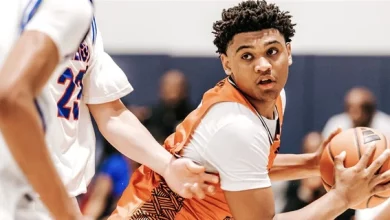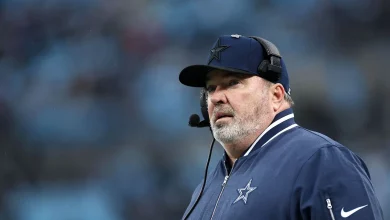The Ravens would have to give up a lot of cap room to move on from Justin Tucker, which may lead to long-term financial and team-building issues.

The NFL is a league driven by talent, strategy, and, importantly, financial management. Every team must juggle the demands of their salary cap, balancing player compensation with the ability to retain key assets and remain competitive. For teams like the Baltimore Ravens, cap space can be both a blessing and a curse. While the Ravens are typically known for their strong defensive play, it’s their special teams—specifically their kicking game—that has played a crucial role in their success. At the center of that is Justin Tucker, arguably the most reliable and skilled kicker in NFL history.
Justin Tucker has been with the Ravens since 2012 and has built an unparalleled resume as one of the league’s most successful kickers. His consistency in clutch moments and ability to make long-distance kicks, including game-winners, has made him a fan favorite and an essential piece of the Ravens’ special teams unit. But as with any elite player, questions about a team’s long-term financial flexibility often arise, especially when it comes to managing cap space and roster construction.
The idea of the Ravens moving on from Tucker, especially in the prime of his career, is a difficult one to fathom. However, such a move would come with substantial consequences—not only would it disrupt one of the league’s most effective special teams units, but it would also have a significant financial impact. This article explores the financial ramifications of parting ways with Justin Tucker, the potential costs to the Ravens’ cap space, and what that might mean for their roster construction going forward.
Justin Tucker’s Legacy in Baltimore
Before diving into the financial logistics of potentially moving on from Tucker, it’s important to appreciate what Tucker has meant to the Ravens. Since entering the league as an undrafted free agent in 2012, Tucker has shattered records and earned a reputation as one of the most clutch kickers the NFL has ever seen.
Tucker holds multiple franchise records for the Ravens, including the most field goals made in a season, the most career field goals made, and the longest field goal in team history (a 61-yard bomb against Detroit in 2013). More importantly, Tucker has been known for his consistency in the clutch, having made 90.6% of his career field goals. His ability to convert under pressure has been critical to Baltimore’s ability to win close games, particularly in a division where every matchup is critical.
Beyond his technical skill, Tucker has become synonymous with the Ravens’ identity. His performances in high-stakes moments, such as his game-winning kicks against division rivals or in playoff games, have cemented his place in Ravens’ lore. This level of reliability is hard to replicate, making the thought of moving on from Tucker feel almost unthinkable to many fans and analysts alike.
The Financial Ramifications of Moving on from Tucker
However, even the most iconic players are not immune to the realities of salary cap management in the NFL. For the Ravens, the cost of moving on from Justin Tucker would be substantial. While the kicker position is generally considered one of the least expensive on the roster, Tucker’s elite performance and reputation as one of the top players at his position come with a price tag.
Tucker is in the midst of a four-year, $24 million contract extension that he signed in 2019, making him one of the highest-paid kickers in the NFL. In terms of cap hit, Tucker’s contract is structured to be relatively friendly for the Ravens in the short term. However, the cost of moving on from him is more than just the voided contract—it would also affect the team’s cap space in the form of dead money, a term that refers to the salary cap charges that a team still carries after a player is released or traded.
Dead Money Implications
If the Ravens were to release Justin Tucker, they would face a significant dead-money hit, which is an immediate financial obstacle. A player’s dead money represents the amount of salary that counts against the cap even after they have been cut or traded. In Tucker’s case, his contract extension includes a signing bonus that has already been prorated over the length of the deal. Should the Ravens part ways with Tucker, they would still be on the hook for the prorated portion of that signing bonus for the remaining years of his contract.
This means that even if the Ravens were to cut Tucker before his contract expired, they would still carry the financial burden of his signing bonus. This amount would be spread out over several years, significantly reducing the team’s cap space in the process. The immediate cost of moving on from Tucker would likely exceed $5 million in dead money, which would be a substantial cap hit for a team that already has to manage the contract situations of key players on both sides of the ball.
Impact on Cap Flexibility and Roster Construction
The Ravens are no strangers to cap management challenges. With quarterback Lamar Jackson on a lucrative contract and key players like wide receiver Marquise Brown, linebacker Patrick Queen, and defensive lineman Calais Campbell to consider in the coming years, the team must be strategic about how it allocates its cap space. Moving on from Tucker, though, would exacerbate this problem.
Cutting Tucker would give the Ravens some cap relief in the immediate future, but the long-term ramifications could be far more damaging. The team would have to allocate resources to replace him, either by signing a new kicker in free agency or through the draft. However, replacing a kicker of Tucker’s caliber is no easy task, and there’s a very real risk that the Ravens would not be able to find someone who can match his consistency and clutch performance. Even if they were to find a replacement, they would still have to manage the dead-money hit, potentially constraining their ability to add other pieces to their roster.
Additionally, moving on from Tucker would impact the overall structure of the Ravens’ special teams. Tucker is the anchor of a unit that has been one of the most consistent in the NFL, and his departure would leave a significant void. The Ravens would have to recalibrate their approach to special teams, possibly affecting the team’s overall ability to win games in situations that hinge on field goals or extra points.
The Psychological and Cultural Cost
While the financial ramifications are significant, there’s also a psychological and cultural cost to moving on from a player of Tucker’s stature. Tucker is not just a kicker; he is a leader in the locker room and an emotional pillar of the team. His professionalism, work ethic, and clutch performances have been integral to the Ravens’ identity.
Losing a player like Tucker could affect the morale of the team, especially for the younger players who looked up to him as a mentor. The team’s ability to function in high-pressure situations, especially in late-game scenarios, could also be impacted. The psychological impact of moving on from a player who has been so dependable for so long should not be underestimated.
Potential Solutions and Alternatives
Given the significant financial and emotional costs of moving on from Justin Tucker, the Ravens may look for alternative solutions rather than releasing or trading him outright. One option could be restructuring Tucker’s contract to lower his cap hit in the short term. The Ravens could extend his deal, spreading out his signing bonus even further to help with cap flexibility. This would allow the Ravens to retain his services while also easing the immediate cap burden.
Another option could be to make Tucker’s contract more performance-based, where bonuses are tied to key metrics, such as field goals made, long-range kicks, and clutch moments. This approach would incentivize Tucker to maintain his high level of performance while keeping the financial impact in check.
Ultimately, the Ravens must carefully consider their options and weigh the costs of parting ways with Tucker against the long-term benefits of maintaining cap flexibility and roster flexibility.









